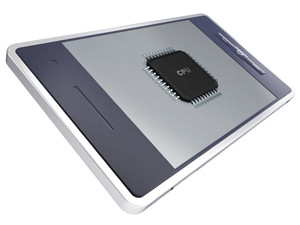
The slowing down of PC sales and increasing smartphone and tablet shipments knocked Advanced Micro Devices (AMD) down to fourth place in microprocessor sales in 2012, according to a new ranking of microprocessor unit suppliers by IC Insights.
Qualcomm has moved into second place and Samsung into third, taking 9.4% and 8.2% of the microprocessor market share, respectively. AMD lost 21% of its share compared to 2011, to drop to fourth place. According to the report, AMD had been ranked just behind Intel since the 1990s.
Processing giant Intel still leads the market with a 65.4% share, but lost 1% of its share to the infiltration of mobile app processors.
Intel has, however, made the shift towards mobile and currently powers 12 smartphones, including the Lenovo K900 and Motorola Razr i, with its Atom processors.
Speaking at the launch of the Lenovo K900 smartphone, at the beginning of the year, president of mobile Internet digital home at Lenovo, Liu Jun, said the company had broken down the key functions of the smartphone and redesigned them from the ground up. "Rather than focus on specifications that look good on a datasheet, we've zeroed in on what consumers want and proved that for smartphone users, top performance doesn't require a thick profile."
New kid on the block
Tech analyst Liron Segev says Qualcomm has upped its game considerably over the last couple of years and raised its own profile by offering developers access to a lot of their own internal programs, such as augmented reality and the AllJoyn network.
"If you're a developer, you have access to all the innovative projects that Qualcomm offers, making the development process a lot easier. They are also putting their chips into more mobile devices and other machines as it's such an attractive ecosystem for developers," he adds.
He says AMD is losing tread as it has not taken the same approach as Qualcomm. "Or they have and are just not doing a good job with it. Therefore, AMD doesn't come to mind when developers are shopping for processors. Qualcomm, on the other hand, is very active in offering innovative applications and tools to make developers' jobs easier."
Segev says it's hard to judge whether AMD is thinking about mobile as it has not really revealed what it is working on. "In this hyper-connected world, where information is everything, people will talk about and use what other people are talking about and using themselves. And there's no talk of an AMD revolution, whereas people are definitely talking about what Qualcomm is doing."
Processing the battlefield
Segev says Intel's reputation and legacy is what is keeping its processors alive in the slowing PC industry. "Even people who are not necessarily part of the tech world will know exactly what you are talking about if you mention Intel. It did superb marketing when it was powering PCs, but Qualcomm is not on the same level when it comes to marketing."
He says the battle is really between Qualcomm and Intel. "Entering the mobile processor market a bit later than everyone else has given Intel the advantage to rectify mistakes, smooth out the bumps, and skip right to a quality end-product."
Segev says Intel could have a hard time convincing smartphone manufacturers to switch as they tend to go for tried and tested products. "They have grown up with Qualcomm, they know what it can do and they build their handsets around that. So there's no real reason for them to change unless Intel comes up with something that will 'wow' them."
Share